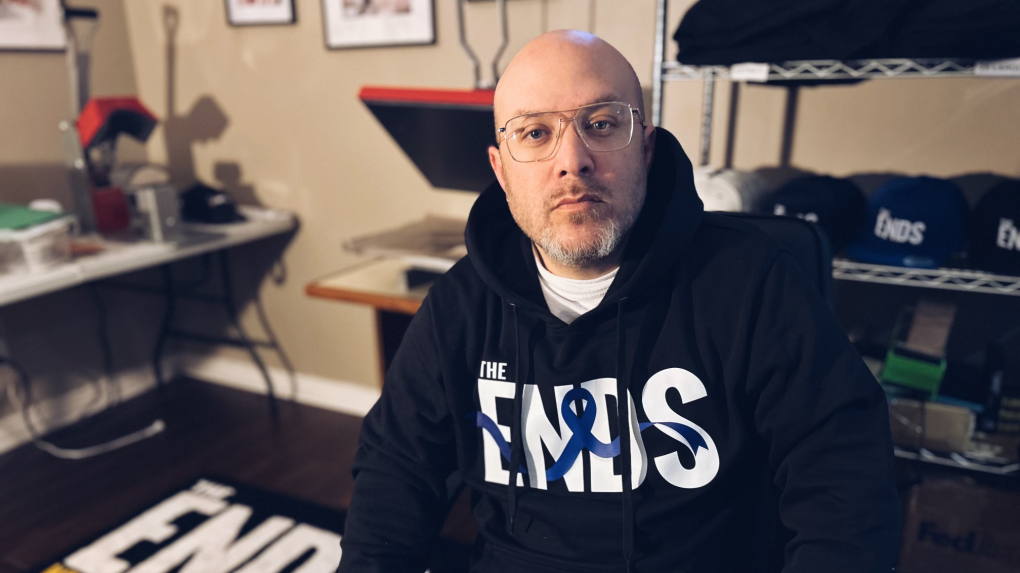Colon cancer is rising in young adults and thousands of Ontarians want to lower the screening age
 Bishop Brigante is seen in this undated photo. The 45-year-old Toronto-area artist is seeking to lower the minimum age for colonoscopies from 50 to 30 years old.(Supplied)
Bishop Brigante is seen in this undated photo. The 45-year-old Toronto-area artist is seeking to lower the minimum age for colonoscopies from 50 to 30 years old.(Supplied)
When Bishop Brigante underwent his first chemotherapy session, he never expected it to end in joy.
Brigante, a 45-year-old artist living in the Toronto area, was diagnosed with colorectal cancer about three months prior, in October 2023.
- Download our app to get local alerts on your device
- Get the latest local updates right to your inbox
The months that followed illuminated a gap in Ontario's health care for Brigante – too many young people were being denied early screening for colorectal cancer.
“The more I talked to people, the more I heard, ‘My doctor won't give me [a colonoscopy]. I’m not old enough. I have to be 50,’” Brigante told CTV News Toronto in an interview last week. “I realized this problem is so much larger than just me and I had to do something actionable.”
While colon cancer rates across all age groups have steadily declined over the last 20 years, Brigante’s effort comes as the disease has seen an unexplained increase in younger Canadians.
 Bishop Brigante is seen in this undated photo. The 45-year-old Toronto-area artist is seeking to lower the minimum age for colonoscopies from 50 to 30 years old.(Supplied)
Bishop Brigante is seen in this undated photo. The 45-year-old Toronto-area artist is seeking to lower the minimum age for colonoscopies from 50 to 30 years old.(Supplied)
“I had no idea about any of this – and my peers, I’m talking about people in their 30s and 40s – they didn’t know either,” Brigante said. “There was just this big flaw in the system.”
So, on Jan. 26, he started a petition seeking to lower the minimum age for colonoscopies from 50 to 30 years old.
Three days later, coming out of his first chemotherapy session and checking the petition, Brigante was met with 5,000 names.
“It’s heartbreaking. It’s heartwarming. It’s all across the board,” he said.
Five days later, 10,000 people had signed.
When Brigante first approached NDP Health Critic France Gélinas, she assumed he was a constituent in need of help accessing cancer care.
"But to my surprise, he wanted to help others," Gélinas told CTV News Toronto last week.
On Tuesday, Brigante, alongside his partner Melanie McVey and Gélinas, presented the petition at Queen’s Park, boasting about 25,000 signatures after only a month of circulation.
“I’ve been around for a long time and I’m often called the queen of petitions,” Gélinas told CTV News Toronto. “And I would have never dreamed that we could get 25,000 in less than a month.”
 Bishop Brigante (centre) is seen at Queen's Park after his petition to lower the minimum age for colonoscopies from 50 to 30 is presented in the legislature. (Supplied)
Bishop Brigante (centre) is seen at Queen's Park after his petition to lower the minimum age for colonoscopies from 50 to 30 is presented in the legislature. (Supplied)
As Brigante watched Gélinas put forth his petition to Ontario’s politicians, he was brought back to the moment of diagnosis.
“I was terrified, holding onto my lady's hand so hard as I cried and took in all the information, and I thought about the millions of people after me that are going to experience that, and I knew I needed to change that,” Brigante said.
“It’s not even an option to me – lowering the age criteria for a colonoscopy is imperative.”
The government now has 24 sitting days to provide a written response to Brigante's request.
Colon cancer in Canada
The Canadian Cancer Society estimates that about one in 16 men and one in 18 women will develop colorectal cancer during their lifetime. The disease makes up about 11 per cent of all cancer death in the country.
Among all age groups in Canada, colorectal cancer is actually decreasing, with rates going down almost every year since the 1980s.
But the decrease seems to be confined to older generations, likely due to an increase in screening after 50.
Among younger adults, incidence rates are increasing – not only in Canada, but in the U.S. and “several other high-income countries,” according to the society. One study, published in the Cancer Epidemiol in 2020, also reported a “concerning increase” in the disease among younger Canadians.
“We are hearing reports of colorectal cancer increasing in adults younger than 50,” Elizabeth Holmes, Director of Health Policy at the Canadian Cancer Society, told CTV News Toronto. “The reason for this remains unclear, but we are monitoring it closely.”
Currently, those diagnosed with colon cancer have a just under 70 per cent chance of survival – a prognosis that continues to improve with screening and treatment technologies.
“At this time, more research is needed to mitigate risk,” Holmes said.
Get a colon cancer screening
Age is still the most significant risk factor with colorectal cancer, Holmes said.
While 50 remains the age for the introduction of routine screening, Holmes underlined that guidance is only in place for symptom-free patients with no history of the disease.
“If you have symptoms, they are not the guidelines that should be referenced,” she said. “If you have blood in your stool, unexplained weight loss, fatigue, and/or changes in bowel movements, you should ask your doctor for a screening.”
Ultimately, Holmes feels patients should listen to their bodies. “Trust yourself, you know what’s right," she said.
With continued investment in treatment and early detection, the Canadian Cancer Society expects that overall prevalence of colorectal cancer will decrease. Those investments, according to Brigante, don't need to be costly for the government, either.
"It costs so much money to treat somebody with cancer – tens of thousands of dollars – as opposed to just giving somebody a colonoscopy when they have symptoms of colon cancer," he said.
"I don't know how it got to this level, but it's God's work now and he's taking the wheel." Brigante continued. "I'm just a vessel that's trying to save lives and, you know, make it a lucrative situation for the government at the same time."
On March 22, Brigante, a hip hop artist and actor, will join forces with the director of Narc, a 2002 neo-noir thriller, and the first movie Brigante ever acted in, to host a 20th anniversary screening of the film at Revue Cinema.
The proceeds will be used to support Brigante and fund his medical treatment while he battles cancer.
 Bishop Brigante and his partner Melanie McVey are seen in this undated image. (Supplied)
Bishop Brigante and his partner Melanie McVey are seen in this undated image. (Supplied)
CTVNews.ca Top Stories

W5 Investigates A 'ticking time bomb': Inside Syria's toughest prison holding accused high-ranking ISIS members
In the last of a three-part investigation, W5's Avery Haines was given rare access to a Syrian prison, where thousands of accused high-ranking ISIS members are being held.
As Australia bans social media for children, Quebec is paying close attention
As Australia moves to ban social media for children under 16, Quebec is debating whether to follow suit.
Irregular sleep patterns may raise risk of heart attack and stroke, study suggests
Sleeping and waking up at different times is associated with an increased risk of heart attack and stroke, even for people who get the recommended amount of sleep, according to new research.
California man who went missing for 25 years found after sister sees his picture in the news
It’s a Thanksgiving miracle for one California family after a man who went missing in 1999 was found 25 years later when his sister saw a photo of him in an online article, authorities said.
Trudeau Liberals' two-month GST holiday bill passes the House, off to the Senate
The federal government's five-page piece of legislation to enact Prime Minister Justin Trudeau's promised two-month tax break on a range of consumer goods over the holidays passed in the House of Commons late Thursday.
Notre Dame Cathedral: Sneak peek ahead of the reopening
After more than five years of frenetic reconstruction work, Notre Dame Cathedral showed its new self to the world Friday, with rebuilt soaring ceilings and creamy good-as-new stonework erasing somber memories of its devastating fire in 2019.
Canada Post temporarily laying off striking workers, union says
The union representing Canada Post workers says the Crown corporation has been laying off striking employees as the labour action by more than 55,000 workers approaches the two-week mark.
Can't resist Black Friday weekend deals? How to shop while staying within your budget
A budgeting expert says there are a number of ways shoppers can avoid getting enveloped by the sales frenzy and resist spending beyond their means.
Montreal shopping mall playing 'Baby Shark' song to prevent unhoused from loitering
A shopping mall and office complex in downtown Montreal is being criticized for using the popular children's song 'Baby Shark' to discourage unhoused people from loitering in its emergency exit stairwells.


































